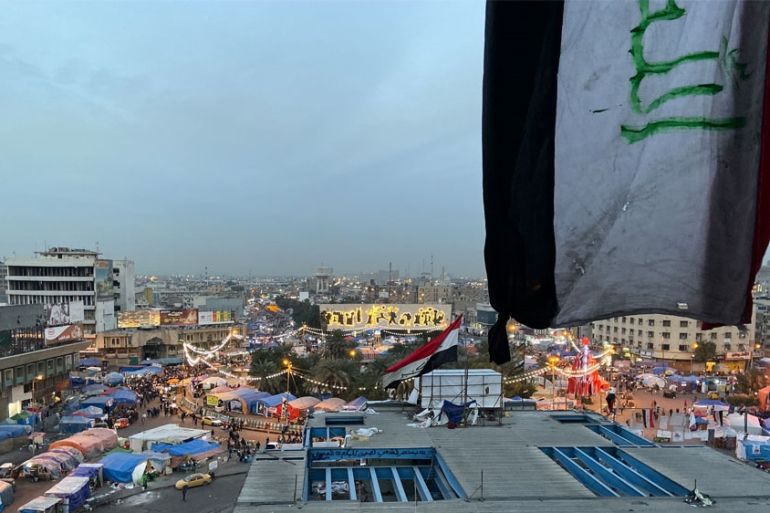Qassem Soleimani killing sparks concerns, deepens divide in Iraq
Anti-government demonstrators want outside forces to respect Iraq’s sovereignty as they fight for political change.

Baghdad, Iraq – In the late hours of a crisp winter’s night, Ahmed al-Rikabi and others are huddled under blankets in a tent in Baghdad’s Tahrir Square.
For these men, most of whom did not know each other before coming to the square but have now formed strong friendships, this tent has been home for almost three months. They are but few of thousands of young Iraqis who have taken to the streets in an effort to change Iraq’s political system – a system which, since 2003, has been dominated and defined by foreign powers and corruption.
Keep reading
list of 3 itemsTrump’s assassination of Soleimani: Five things to know
The Iraqi people will pay the price for Iran-US rivalry, again
Across the Tigris River, in the capital’s Green Zone, momentum has been building for an effort by pro-Iranian politicians to expel United States forces from the country in the wake of last week’s US assassination of Iranian commander Qassem Soleimani and Iraqi militia leader Abu Mahdi al-Muhandis near Baghdad’s airport.
A non-binding parliamentary motion tabled on Sunday passed with a landslide – though almost all Kurdish and Sunni ministers of parliament boycotted the vote.
Yet, while the political tide is moving in one direction, those in the square – the hub of the months-long protest movement – are not convinced it is flowing the right way.
For some like al-Rikabi, there is the fear that the Baghdad elite may try to hijack the sacrifices of his fellow protesters – at least 500 have been killed in a vicious clampdown by security forces since October – and many of those in Tahrir Square allege that Iran was partly to blame for it.
“We here have all seen and felt what this government has done,” al-Rikabi said. “They have done it with Iranian help, they did it with Qassem Soleimani too.”
Meanwhile, there was President Donald Trump‘s threat of sanctions in the event of a US withdrawal.
“It’ll make Iranian sanctions look somewhat tame,” Trump warned, referring to the punishing economic measures reimposed by Washington as part of a “maximum pressure” campaign against Tehran.
That threat evoked memories of the 1990s when Iraq’s economy and infrastructure was punished by crippling sanctions in the wake of President Saddam Hussein’s invasion of Kuwait – then it was the people who paid the price.
We don't want our politicians to force us into camps to either be pro-US or pro-Iran.
For some in Parliament, the killing of Soleimani and al-Muhandis was the final straw for an unwelcome US presence in the country that had already lasted too long.
Baghdad’s political class claims it has galvanised political support for Tehran and Iraq’s pro-Iran leaders.
“They lost a person [Soleimani] but they regained the people,” said Sami al-Askari, a former minister of parliament and chief of staff to former Prime Minister Nouri al-Maliki.
“I think the Iranians have now won most of the Iraqi Shias, even the voices against Iran have vanished.”

Yet for many protesters, the assassination of Soleimani in Baghdad and the events that followed – including Iran’s retaliatory missile strikes on Wednesday at Iraqi bases housing US troops – raised fears their country could become a playground of conflict between Tehran and Washington.
“We do not hate America, we just want the world to respect our sovereignty. This is about Iran just as much – it is about anyone who tries to violate our sovereignty,” said Asrhad al-Karbali, who said he gave up his job as a policeman to come to Tahrir.
Others said the effort by some politicians and militia heads to capitalise on the moment laid bare a significant disconnect between those who have camped out in cities across the country and Iraq’s political class.
“We don’t want our politicians to force us into camps to either be pro-US or pro-Iran – I don’t think that’s healthy,” said Sajad Jiyad, managing director of Bayan Center, a think-tank based in Baghdad.
“For the average Iraqi, the protesters, they don’t want to be talking in terms of the US and Iran,” he added. “They want to be talking about what’s happening for us on the ground in terms of services, the protection of rights and political reforms”.